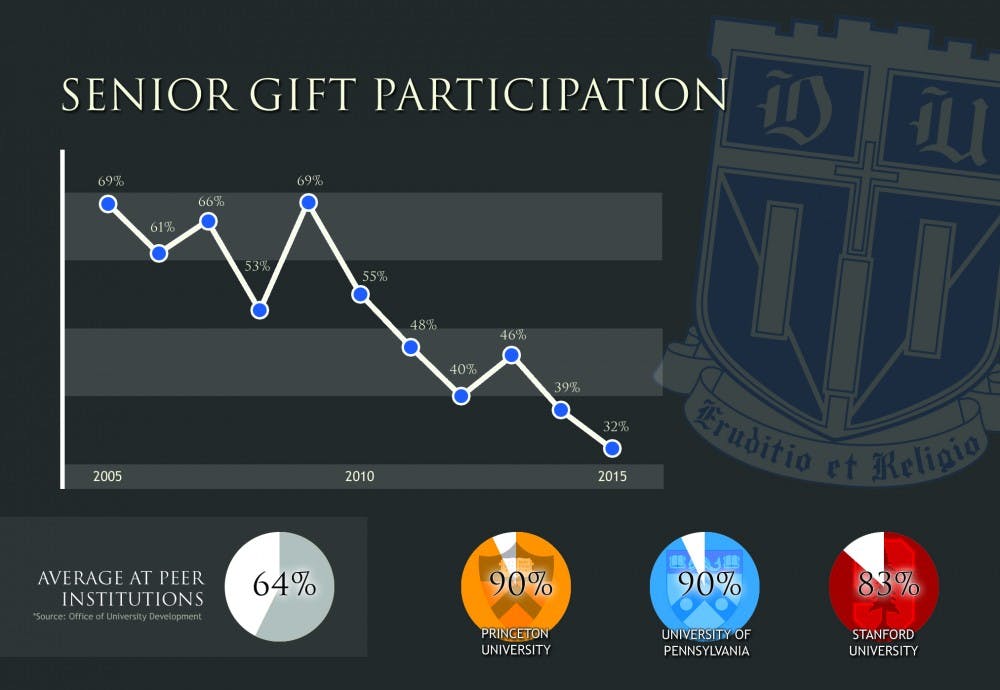On the morning of the Blue and White Dinner, I couldn’t find a spot in any of the Blue Zone lots before my first class. Irrationally indignant and angry, I fled to the Bryan Center parking lot and snagged a spot just as someone else was leaving. The ordeal left a bad taste in my mouth, even though I knew it was really only my fault that I hadn’t left in time to find a spot, and I was lucky enough to have gotten this one. So I can’t say I was really all that surprised when I got back to my car after class to find the ominous gold envelope on my windshield that I have become all too familiar with—a parking ticket. I’d gambled with the parking gods, and I had lost. It happens. If I were a better person, I would pay for my parking all the time—it is the law, after all—but I didn’t on this day.
I was still a little annoyed—though mostly at myself—when I arrived at the Washington Duke Inn later that evening for the Blue and White Dinner, an annual event to honor the graduating class brought to us by the Duke Annual Fund in collaboration with President Richard Brodhead and his wife, Cynthia. Or as I liked to think of it: unlimited wine on Duke’s dime.
But as the evening unfolded, it was clear that even though I’d been lured in with wine and the prospect of seeing how many people I had managed to completely avoid in nearly four years here, there was an ulterior motive at play. From the long stretch of tables lined with laptops at the entrance to the ballroom to the stickers with the Senior Gift logo emblazoned on them, the call for money filled the incredibly large room. The feeling really came to a head when Brodhead took the stage. Sure, he began by congratulating us on making it this far, but he ended his speech by asking us to donate to the University—to start our alumni career by giving back before we had even started our post-graduate jobs.
It felt unnecessary to me. I had just gotten a $20 parking ticket. I was already giving back to the University. My last tuition payment had barely had time to clear the bank yet, but I was already being asked to give more. It felt annoying. Couldn’t Duke wait to ask me for donations until I had at least gotten my first paycheck?
Right then, I vowed—a few times, I think—that I would not be giving to the Senior Gift fund. And yet, yesterday, only a few weeks after my initial vow, I pledged my donation. I feel a little hypocritical, but I know I did the right thing.
Here’s the thing—sometimes Duke sucks. There are so many things that I want to change about this place, things that I think about every single day, from mundane inconveniences like construction to some really crucial disagreements I have with administrative stances on diversity or support for women. But despite all of that, this University has given me some amazing experiences, and I want future students to have those same opportunities. Even with my small contribution, I am helping in the best way that I can to pay forward my good fortune. And I feel privileged that I am able to do so.
Apparently, though, not everyone feels the same way.
“Unfortunately, senior gift participation has lagged in recent years, especially compared to our peers,” Melissa Antaya, director of marketing for the Office of University Development, previously told The Chronicle.
It’s true. Last year, 32 percent of seniors gave a senior gift of any size, according to OUD data, compared to an average giving rate of 64 percent at schools OUD classifies as peer institutions. At both Princeton University and the University of Pennsylvania, 90 percent of the class gave, while 83 percent donated at Stanford. Our peers are beating us, which could explain why the OUD is trying new techniques to get seniors engaged with donating. From the clever, if slightly over-done, campaign they used to set up a donation rivalry with UNC seniors to their cheesy suggested donation of $20.16 for the Class of 2016, they are clearly trying hard.
But it is just so hard to feel motivated to give, when everything else seems to cost money at this point in senior year. I just paid my security deposit on a Manhattan apartment, a sum of money that I never would have wanted to just hand away. But the money for the senior gift is meaningful to Duke.
“The Duke Annual Fund, which is supported through the Senior Gift, helps make the Duke student experience possible,” Antaya previously told The Chronicle. “For example, Annual Fund dollars help fund financial aid, merit scholarships, and graduate fellowships. They can also help support some of your favorite professors, pay for internship stipends and enhance campus treasures like the libraries, gardens, and chapel.”
I was fortunate enough to have had a contracting job throughout this year that meant a steady paycheck, even though I don’t start working full-time until after graduation. That means allowing my bank account to cut ties with my donation hurt a little less than it could have if I was really strapped for cash. For people who aren’t in that situation, it might feel easy to feel guilted to donate even when it would be a financial strain. And that shouldn’t be the goal of this fundraising. There are lots of ways that soon-to-be-alumni can give back to a University that has given so much to them, and the senior gift is just one manifestation of that.
Get The Chronicle straight to your inbox
Sign up for our weekly newsletter. Cancel at any time.

